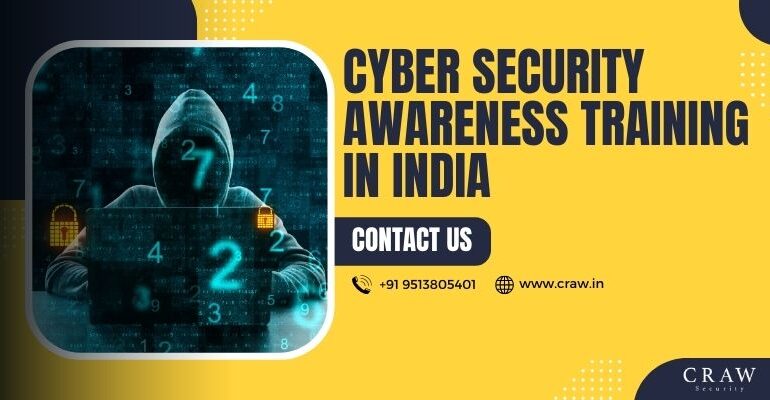Cyber Security Awareness Training in India

Cyber Security Awareness Training in India
Introduction: Cyber Security Awareness Training
In the purview of enhancing the Cyber Security Awareness of every stakeholder in the current society, which is continuously adapting to new changes in this technology-based world, we have accepted every measure that comes with a good possibility. With the change in the breakdown of conventional manual methodologies into the digital world, it has become the need of the hour to shape up our future in such a way that it helps in booming our cyber security awareness to a great extent.
In the following article, we have tried to shed some light on the mainstream features responsible for upgrading our existing Cyber Security Awareness to mass measures.
Importance of Cyber Security Awareness Training
In order to protect people, businesses, and society from the ever-increasing threats in the digital sphere, cybersecurity awareness training is essential. The following are some significant aspects in favor of cybersecurity awareness training:
| Mitigating Human Error | One of the main reasons for security breaches is always human mistakes. Cybersecurity awareness training gives people the necessary information and abilities they need to identify and prevent possible dangers like phishing attempts, social engineering, and malware. |
| Strengthening Defense Layers | Typically, businesses have several layers of cybersecurity defenses in place, such as firewalls, antivirus programs, and intrusion detection systems. However, if people inside the firm become targets of cyber attacks, these technological measures may be bypassed or rendered useless. |
| Protecting Sensitive Data | Data can be understood as a highly precious resource in the age of connectivity. People who receive cybersecurity awareness training are better equipped to appreciate the need to safeguard sensitive data, including financial information, intellectual property, and personally identifiable information (PII). Enterprises can lower the likelihood of data breaches and illicit intrusions by educating people about secure data handling procedures, encryption, password management, and safe browsing habits. |
| Preventing Financial Losses | Cyberattacks have the potential to cause both people and businesses to suffer enormous monetary damages. These types of Cybersecurity Awareness Training programs enlighten people about financial fraud, online fraud, and identity theft so they can safeguard themselves from financial abuse and make proficient educated choices. |
| Promoting a Culture of Security | Training in cybersecurity awareness helps firms develop a security-conscious environment. Individuals grow more cautious and responsible for their behaviors when they are adequately informed about and actively participating in cybersecurity measures. |
| Compliance with Regulations and Standards | Specific rules and regulations that apply to several industries mandate that businesses deploy cybersecurity safeguards and train staff. |
Cyber Security Awareness Tips
We understand the volatile nature of data and how it can hamper the lives of all beings on Earth. Simply by studying the pattern of their living style, eating habits, travel plans, and other forms of digital footprints, it has now become clear that we sincerely require good cyber security awareness among all types of people.
In addition to this, we have jotted down some highly important cyber security awareness tips for almost section of society:
- Use Strong and Unique Passwords with special characters, uppercase, lowercase, and numbers.
- Keep changing the passwords with random stings that are harder to predict by any malevolent adversary just trying to steal your hard-earned money or datasets.
- Enable Two-Factor Authentication (2FA).
- Be Cautious of Phishing Attempts.
- Keep Software and Devices Updated.
- Secure Your Wi-Fi Network.
- Be Mindful of Public Wi-Fi or try to limit your usage on them.
- Be Selective with App Permissions.
- Backup Your Data Regularly.
- Be Wary of Social Engineering.
- Educate Yourself.
Cyber Security Awareness in the Workplace
To safeguard confidential data, uphold system integrity, and guarantee the association’s comprehensive safety posture, job-related cybersecurity awareness is essential. It entails training staff members on potential online dangers, safe browsing habits, and their responsibility for protecting company data.
Organizations may enable their workforce to recognize as well as react to phishing efforts, fraudulent emails, and social engineering techniques by fostering a culture of security.
Employees can benefit from regular training sessions, workshops, and awareness campaigns that emphasize the value of secure browsing, data encryption, strong passwords, and the potential repercussions of careless behavior.
Every employee should be a watchful protector of cybersecurity since this makes the workplace safer and more robust, which lowers the possibility of data breaches, monetary losses, and reputational harm. Hence, we should start engagement of Cyber Security Awareness Training for Employees so that they can never come into any kind of trap initiated by cyber criminals.
Cyber Security Awareness for Students
In the present-day online era, when online activities significantly influence students’ educational, social, as well as private lives, students must be aware of cybersecurity issues. Students need to comprehend the dangers of disclosing sensitive data online, the value of secure passwords, and the potential repercussions of engaging in risky online behavior.
Students can acquire the skills and knowledge required to defend themselves from cyber risks by being taught about phishing scams, malware, social media privacy settings, and responsible digital citizenship. The importance of using critical thinking and checking facts before sharing or clicking links must be emphasized.
Careers in Cybersecurity
Due to the growing significance of safeguarding information and digital assets from online attacks, cybersecurity enables an abundance of lucrative and in-demand employment. Here are a few well-known careers in cybersecurity:
- Information Security Analyst,
- Ethical Hacker/Penetration Tester,
- Security Consultant,
- Security Architect,
- Incident Responder,
- Cryptographer,
- Security Operations Center (SOC) Analyst,
- Forensic Analyst,
- Cybersecurity Manager,
- Security Auditor, etc.
Cyber Security Regulations in India
The current cybersecurity laws in operation in India are listed below:
- The Information Technology Act, 2000
- Information Technology (Amendment) Act 2008
- Information Technology Rules, 2011
- Indian SPDI Rules, 2011 for Reasonable Security Practices
- National Cyber Security Policy, 2013
- IT Rules, 2021
- National Cyber Security Strategy 2020
- KYC (Know Your Customer)
- Reserve Bank of India Act 2018
Here, we will try to elaborate on the above-mentioned Cyber Security Regulations in India one by one in the following paragraphs:
1. The Information Technology Act, 2000
The Information Technology Act of 2000 was the nation’s initial major cybersecurity law.
The Indian Computer Emergency Response Team (CERT-In) is responsible for enforcing the IT Act of 2000, which was passed by the Indian Parliament to direct cybersecurity legislation, establish data protection standards, and control cybercrime. Along with many other things, it defends online banking, online shopping, and the private sector.
2. Information Technology (Amendment) Act 2008
The IT Act of 2000 was significantly expanded by the Information Technology Amendment Act of 2008 (IT Act 2008), which was passed in October 2008 and went into effect the following year. The first measure, which initially failed to open the door for additional IT-related development, was improved by these revisions.
In addition, it was praised as a ground-breaking and eagerly anticipated step toward an enhanced cybersecurity architecture in India.
3. Information Technology Rules, 2011
The Information Technology (Reasonable Security Practices and Procedures and Sensitive Personal Data or Information) Rules 2011 (Privacy Rules) are another significant piece of cybersecurity law covered by the IT Act.
The most notable changes concern intermediary regulation, revised penalties, and fines for cheating, defamation, and distributing private photographs without consent, as well as speech censorship/ restriction and cybercrime.
4. Indian SPDI Rules, 2011 for Reasonable Security Practices
The Indian SPDI Rules, 2011, designate the IS/ISO/IEC 27001 norms as global standards. As a result, Indian businesses are not required to follow these guidelines, but they are strongly encouraged to do so since they can assist them in adhering to the “reasonable security practices” required by Indian law.
Additionally, the regulations may grant people the ability to rectify their information and establish limitations on information dissemination, data transfer, and security measures.
5. National Cyber Security Policy, 2013
The National Cyber Security Policy 2013 was published in 2013 by the Department of Electronics and Information Technology (DeitY) as an organizational security structure for public and commercial entities to better defend themselves against cyberattacks.
In addition, the National Cyber Security Policy’s objective is to build more flexible policies that would better safeguard India’s online ecosystem.
6. IT Rules, 2021
The Information Technology (Guidelines for Intermediaries and Digital Media Ethics Code) Rules, 2021, were introduced by the Ministry of Electronics and Information Technology on February 25, 2021, to replace the IT Rules, 2011. A little over a year later, on June 6, 2022, the Indian MeitY (Ministry of Electronics and IT) announced the freshly revised proposed modifications to the IT Act in an effort to make it more effective and keep up with the difficulties of the rapidly evolving digital ecosystem.
7. National Cyber Security Strategy 2020
The National Cyber Security Strategy of 2020 represents the much-anticipated subsequent follow-up schedule by the Government of India to further strengthen its cybersecurity initiatives. Whilst the plan is still being developed and under consideration by the National Security Council Secretariat, its primary objective is to be used as the official direction for stakeholders, policymakers, and corporate leaders to prevent cyber incidents, cyber terrorism, and cyber espionage.
8. KYC (Know Your Customer)
The RBI (Reserve Bank of India) has made KYC (Know Your Customer) protocols mandatory. These norms and procedures are employed all across the world. When it comes to better protecting against scams and the unauthorized use of payment credentials, KYC refers to the monitoring and tracking of client data security. Every customer of banks, insurance firms, and other digital payment providers that conduct financial transactions must be verified and identified.
9. Reserve Bank of India Act 2018
The RBI Act, which outlines cybersecurity policies and regulations for UCBs (urban cooperative banks) and payment operators, was enacted by the Reserve Bank of India in 2018.
Government Initiatives for Cyber Security Awareness in India
To raise the general public’s understanding of cyber safety concerns and strengthen the nation’s overall cyber resilience, the Indian government has launched a number of projects. Some of the notable Indian government programs are as follows:
- Cyber Swachhta Kendra (Botnet Cleaning and Malware Analysis Centre),
- Cyber Surakshit Bharat,
- National Cyber Coordination Centre (NCCC),
- National Cyber Security Policy,
- Cyber Crime Prevention Against Women and Children (CCPWC) portal,
- Cyber Dost,
- Cyber Surakshit Bharat Yojana,
- National Critical Information Infrastructure Protection Centre (NCIIPC), and many more.
The Benefits of Cybersecurity Awareness Training
The are many prominent benefits of Information Security Awareness via a proper training methodology facilitated by a well-qualified, skilled, and motivated mentor having years of quality experience. For this, you can join well-programmed training under the guidance of certified, skilled, and experienced instructors at Craw Security, the Best Cybersecurity Training Institute in India.
In addition, some of the prominent benefits of cybersecurity awareness training are as follows:
- Risk Reduction,
- Mitigation of Human Error,
- Protection of Sensitive Data,
- Enhanced Incident Response,
- Compliance with Regulations,
- Creation of a Security-Conscious Culture,
- Cost Savings, etc.
Cyber Security Awareness Service
An extensive solution called a cybersecurity awareness service is created to inform people and companies about cybersecurity risks, best practices, and defensive measures against online dangers. This service often consists of a variety of initiatives and tools designed to spread cybersecurity knowledge and create a culture of security awareness.
Moreover, some of the key characteristics and features of a cybersecurity awareness service are as follows:
- Training and Education,
- Awareness Campaigns,
- Phishing Simulations,
- Policy and Procedure Development,
- Security Assessments and Audits,
- Ongoing Support and Resources,
- Metrics and Reporting, etc.
Top Security Awareness Topics
Numerous key areas are there that people and enterprises should concentrate on when it comes to thinking about distinguished security awareness topics. Here are a few of the most important security awareness topics to think about:
- Phishing Awareness,
- Password Security,
- Social Engineering,
- Malware Awareness,
- Data Privacy,
- Mobile Device Security,
- Secure Remote Work,
- Social Media Awareness,
- Incident Reporting and Response,
- Internet of Things (IoT) Security, etc.
FAQs: About Cyber Security Awareness
1: What is the cyber security awareness?
The wholesome knowledge that should be given to every individual regardless of their profession and educational background is known as cyber security awareness.
2: How important is cyber security awareness?
It is highly important to grab authentic cyber security awareness so that we can save ourselves, as well as our near-dear ones, from the harmful effects of cyber frauds that are on high pitch in the current conditions throughout the world.
3: What are the 6 tips for cyber security awareness?
The primary 6 tips for cyber security awareness are as follows:
- Use Strong and Unique Passwords,
- Enable Two-Factor Authentication (2FA).
- Be Cautious of Phishing Attempts.
- Keep Software and Devices Updated.
- Secure Your Wi-Fi Network.
- Be Mindful of Public Wi-Fi or try to limit your usage on them.
4: What is basic security awareness?
To defend themselves and the digital assets they possess from cyber threats, people should have a basic understanding of cybersecurity best practices. This is referred to as basic security awareness.
5: What is cyber awareness for students?
In the present-day online era, when online activities significantly influence students’ educational, social, as well as private lives, students must be aware of cybersecurity issues. Students need to comprehend the dangers of disclosing sensitive data online, the value of secure passwords, and the potential repercussions of engaging in risky online behavior.
6: What is the theme of cyber awareness?
Depending on the setting and intended audience, the theme of cyber awareness may change. Nevertheless, the main focus of cyber awareness campaigns often is on fostering a culture of cybersecurity, highlighting the significance of being alert to and knowledgeable about cyber threats, and supporting responsible online conduct.
7: What are the benefits of security awareness?
The main benefits of cyber security awareness are as follows:
- Risk Reduction,
- Mitigation of Human Error,
- Protection of Sensitive Data,
- Enhanced Incident Response,
- Compliance with Regulations,
- Creation of a Security-Conscious Culture,
- Cost Savings, etc.
Wrapping Up
In final words, we would like to say that there is an abundance of cyber security awareness providers in the market today. However, you just need to follow the best cybersecurity training provider in India, which is Craw Security. A person can even contact Craw Security if he is willing to make an outstanding career in the cybersecurity domain.
To book a demo session with our highly qualified training instructors, call +91-9513805401.
















